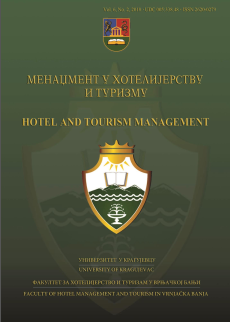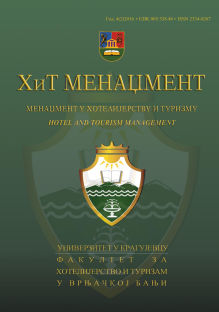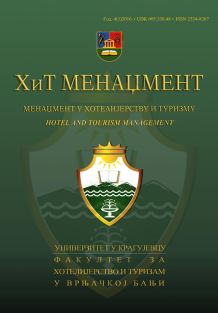Author(s): Hümeyra TÖRE BAŞAT,Makbule Akagündüz / Language(s): Turkish
Issue: 3/2018
Businesses have to acquire quality goods and services production and also a strong image perception for perpetuating their lives in increasing competition conditions and for persistent trailing in minds in the future. Individuals prescribed ideas, intuitions, impressions, and perceptions about the institution determine corporate image and affect people’s thoughts that want to make a career in these businesses. Individuals want to able to rise in their business and in their life, have access to better status and have a bright career. When individuals realize their career wishes, they try to determine; what is important for themselves and in which career can match with their characteristics, abilities, and knowledge. This research was conducted in order to determine the effects of university tourism education students’ perceptions of the institutional image pertaining to the sector on their willingness to make a career.Many factors in career trend and evolution (job satisfaction, organizational cynicism, mobbing, social credibility of the profession, person’s family life, abilities and skills etc.) can create positive/negative effects. The most important factor in “creating a positive corporate image” is “human”. Businesses can give quality service with qualified employees. Especially in the tourism sector; structure stands in the forefront is “labor”. In businesses that give importance to “human” factor, employees plan a career with the subject corporate image perceptions. In this context, undergraduate degree students’ corporate image perceptions for the sector effects in the subject making career claims researched and accepted the main purpose. The basic hypothesis of the research is presented below. Hypothesis: The corporate image in the tourism sector has a meaningful effect on making a career demand.Declared this hypothesis attracts attention to two different points. First one is the trend to businesses’ increasing service quality and managing their corporate image in a positive way to bring them “businesses that preferred by the employees”. The other option is “businesses that preferred by the employees” can increase “qualified employee gain”. Image defines “a person’s or a community’s impression in relation to himself and want to create someone else (Dowling, 1994: 8). Corporate image can be defined as “general impression” positive or negative emotions, ideas, attitudes, and experiences about the institution accumulated stared in memories (Salam et al., 2013: 177). The organization members’ beliefs according to “how other people seeing the institution” (Parent and Foreman, 2007: 15). Corporate image is a result of a persons’ all experience, impression, faith, emotion and information’s interaction about the institution (Lin et al., 2015: 3).The basis of the word “career” is known in Latin “carrus” (freight wagon), in French “carrier” (running track), in English “career” (job business life). “Career” word leaps to Turkish from French word “carrierre” word identified as a “specialization at a job” in Turkish Language Institution”. Career concept defined in different shapes by many researchers.“Making a career demand” or in other words “career trends” couched in as “individuals’ evaluate the most appropriate job in terms of their needs and expectations according to their own knowledge, skill and abilities” (Pehlivan, 2008: 51; Aktaş vd., 2013: 62; Kuzgun, 2000). In many working areas, it can be mentioned from “making a career demand” and “selection of the business” (Türkay and Tüzemen, 2009: 216).Individuals want to work and earn income because of economic and social components. In this demand effect of psychological needs are important too. Correspond of economic, social and psychological needs are very significant at “decide on a career”, “making a career demand” and “career development”. The best career trend is individuals’ expectations, requirements and necessities welcomed in the best way (Mazgal, 2013: 19; Baydur, 2014: 26-17; Sabuncu, 2015: 13; Pilavcı, 2007: 30; Yumuşak and Çoban, 2012: 77).The scope of the research, in the Aegean region in 2015-2016 academic year is comprised of students in Tourism Faculty of Tourism. A survey on the tourism faculty students on the issue was conducted. The questionnaire used as a data collection tool was created three sections. The first part of the survey is the question that aimed to determine the individual characteristics of the participants. In the second and third sections, there were scales of sectoral image and career making desire to determine the effects of the participants on the sectoral image perceptions and desire to make a career. As a result of the survey results, the frequency, percentage and arithmetic mean of respondents’ responses were determined. In addition to this, t-test was used in binary comparisons and variance (ANOVA) analysis in three or more comparisons by determining whether the students’ perceptions of institutional image pertaining to the sector and their desire to make a career were significantly different according to the individual characteristics of the participants. “Making a career demand” and “career planning” is very important many of the individuals. This also provides significant benefits to the businesses. Especially being preferred by the employees in terms of personnel acquisition and requirement of qualified employee come forward in this subject. At this point “the impact of corporate image” appears because of individuals’ making a career demands can be formed from different efficient. We can summarize this study with two variants. First one is “general impressions remain in people’s minds about the organization negative or positive emotions, ideas, approaches and experiences. The other one “career trend” means individuals’ evaluate professions and decide the most appropriate for themselves.In this study, we studied the image perceptions of the university students that receive education in tourism at undergraduate level effect of their making a career demand. According to the results, generally participants have ideas below medium level about corporate images of tourism enterprises. On the other hand when we look at the participants’ making a career demand, we state that they were below medium level. At this point, especially “sectoral experience” that participants have shown parallelism with “making a career demand according to “corporate image”.The hypothesis of the study is “the effect of corporate image on making a career demand.If we can determine the factors that students’ negative perceptions intended to sector, we can develop solution proposals according to these factors and also strategies and planning to create on effective corporate image perception. Especially if we can solve the problems experienced during the internship process, we can provide individuals that receive sectoral education stay in tourism sector.We can take core that employees receive tourism sector education must be employed. Thus we can protect employee rights and apply legal regulations that provide occupational standardization. At the same time, this application can feel students important for the businesses and has a positive effect “making a career” demand in the sector. Consequently to this ratio of trained staff in the sector will increase.Students have to know that when they choice their job; respect in society, good earnings and social status can’t be only the decisions. When they choose their jobs, they have to have knowledge about their job and have to research and review about the job to make acquaintance.If we can tell the career days arranged in universities to students, they can interview with company representatives. This provides them to have knowledge about the profession and be easier for them to choose a profession. One of the important factors affect the making a career demand of the students is environment factor (family pressure, negative attitudes to profession, cheap work force). We can get help from experts discourage the negative thoughts. We must develop different measuring tools and vocational guidance programs for students to able to make right vocational trend.
More...



